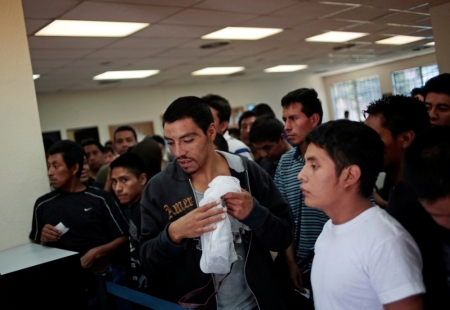Is Illegal Immigration No Longer a Crime in California?

Amidst a long and protracted political debate over immigration reform and federal inaction, California has been steadily moving towards effectively providing legal status to undocumented immigrants across the state.
Democrat Governor Jerry Brown signed legislation earlier this week striking the word "alien" from the state's labor code, as well as a measure allowing unauthorized immigrants to serve as election poll workers. Already statewide, undocumented immigrants have been appointed to state or local governmental positions in California.
According to The Associated Press, over 50 percent of new drivers licenses issued in California are given to unauthorized immigrants. The state also allows unauthorized immigrants to receive in-state tuition, and access to state healthcare programs.
While San Diego, San Francisco, and Los Angeles are all "sanctuary cities," Brown has signed measures to strengthen the rights of unauthorized immigrants, protecting them from deportation across the entire state. The law, known as the "Trust Act," limits counties in efforts to cooperate with federal officials in regards to undocumented immigrants.
Sanctuary cities, while having no specific legal definition, generally refers cities that do not provide municipal funds for upholding immigration law or inquiring about a person's legal status.
A June op-ed in the Los Angeles Times dubbed the immigration reforms, "The California Package."
"The California package is innovative in several respects," wrote the authors. "Not only does it grant rights to immigrants that are restricted at the federal level, but it also tends to blur the distinction between citizens, authorized, and unauthorized immigrants — valuing everyone who lives in the state and contributes to society."
According to the Migration Policy Institute, over 3 million of the 11.4 million undocumented immigrants in the U.S. live in California. Seventy percent of California's unauthorized immigrants hail from Mexico and over a quarter of its residents were born outside the United States.
"We've passed the Rubicon here," Mike Madrid, a Republican strategist, told the Los Angeles Times. "This is not an academic debate on the U.S. Senate floor about legal and illegal and how high you want to build the wall .... [The state] doesn't have the luxury of being ideological. ... The undocumented are not going anywhere."
According to the Federation for Immigration Reform, illegal immigration costs California taxpayers over $25 billion annually.
While Republican presidential candidate and businessman Donald Trump magnified the issue of illegal immigration in the media, he also raised the rhetoric and coverage of high-profile crimes being committed by unauthorized immigrants.
Trump joined forces with the family of Jamiel Shaw, who was murdered by an unauthorized immigrant in Southern California, as well as spoke out on the death of Kathryn Steinle, who was gunned down by an unauthorized immigrant from Mexico at a pier in the summer of 2015. Both of the accused had previous run-ins with the law. The alleged murderer of Steinle, who originally confessed to the crime and then recanted, had been deported five times. San Francisco officials had released the murder suspect, instead of turning him over to immigration officials, because of their sanctuary status.
Some lawmakers, mostly conservative Republicans, are calling for federal legislation to cut off funding for states and sanctuary cities for refusing to cooperate with or inform Immigration and Customs Enforcement officials. Presidential candidate and Texas Senator Ted Cruz introduced the legislation in the Senate, only to have Majority leader Mitch McConnell, R-Ky, try to block the bill. The U.S. House passed the bill in July, despite opposition from Democrats and a minority of Republicans.
After another woman was brutally murdered by an unauthorized immigrant and an accomplice in July in Santa Maria, the city's police chief had harsh words for the state and federal government.
"I think it starts in Washington, D.C., with this administration that we see and their policies. I think you can draw a direct line over to Sacramento with the policies of, I'm going to say, this governor and the Legislature," Santa Maria Police Chief Ralph Martin said at a news conference regarding the killing. "And I am not remiss to say that from Washington, D.C., to Sacramento, there's a blood trail into the bedroom of Marilyn Pharis."
One of the suspects in the killing of Marilyn Pharis was arrested five days prior on probation violation. Pharis, 66, was sexually assaulted and bludgeoned to death with a hammer in her own home. The immigration status of the suspect, who has numerous arrests and convictions, was not turned over to federal officials. The Obama administration accuses Republican obstructionism in Congress for keeping the government from dealing with the law enforcement side of the debate. The last major federal immigration reform legislation occurred in 1986, during the presidency of Ronald Reagan.
In response to those recent headlines linking immigrants to violent crimes, the Wall Street Journal, a conservative newspaper, published a piece titled, "The Mythical Connection Between Immigrants and Crime" in July. The op-ed argued that "numerous studies going back more than a century have shown that immigrants — regardless of nationality or legal status — are less likely than the native population to commit violent crimes or to be incarcerated."
Despite the apparent political divide on immigration, most politicians in California, including an increasing number of Republicans, argue that the best path forward is comprehensive reform and a path for legalization.
While some state lawmakers and governors argue for tightening or enforcing federal restrictions, California is taking action on immigration reform in what it believes to be an inevitable path to citizenship for millions of undocumented immigrants.





















